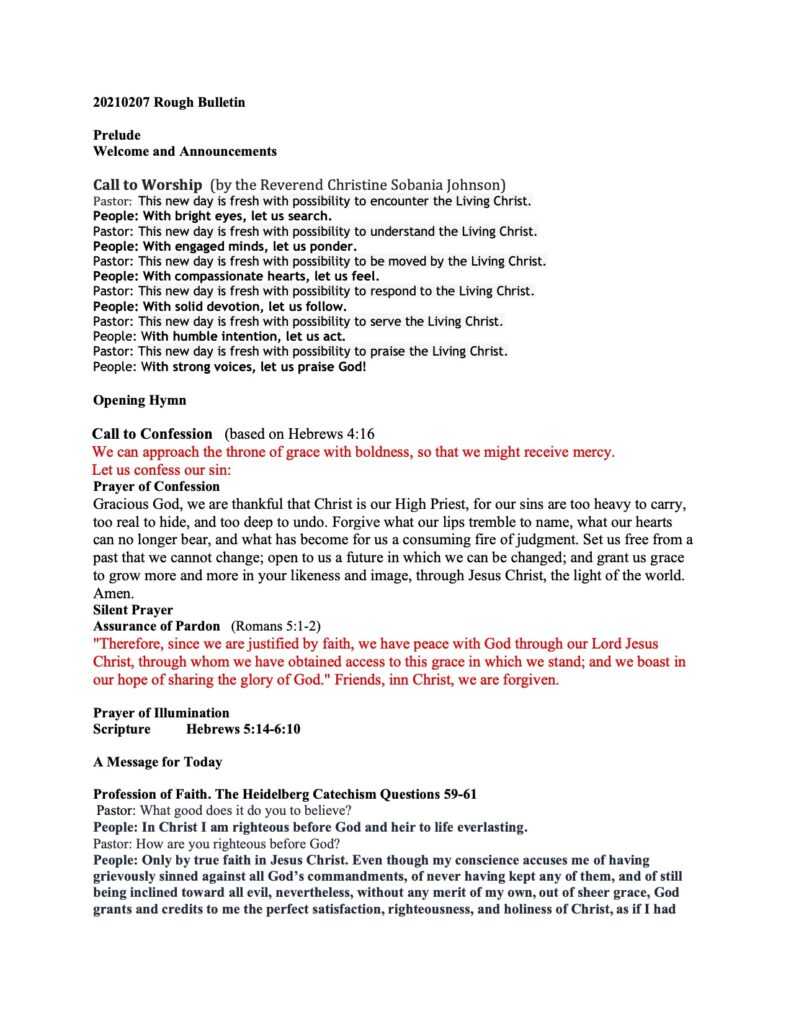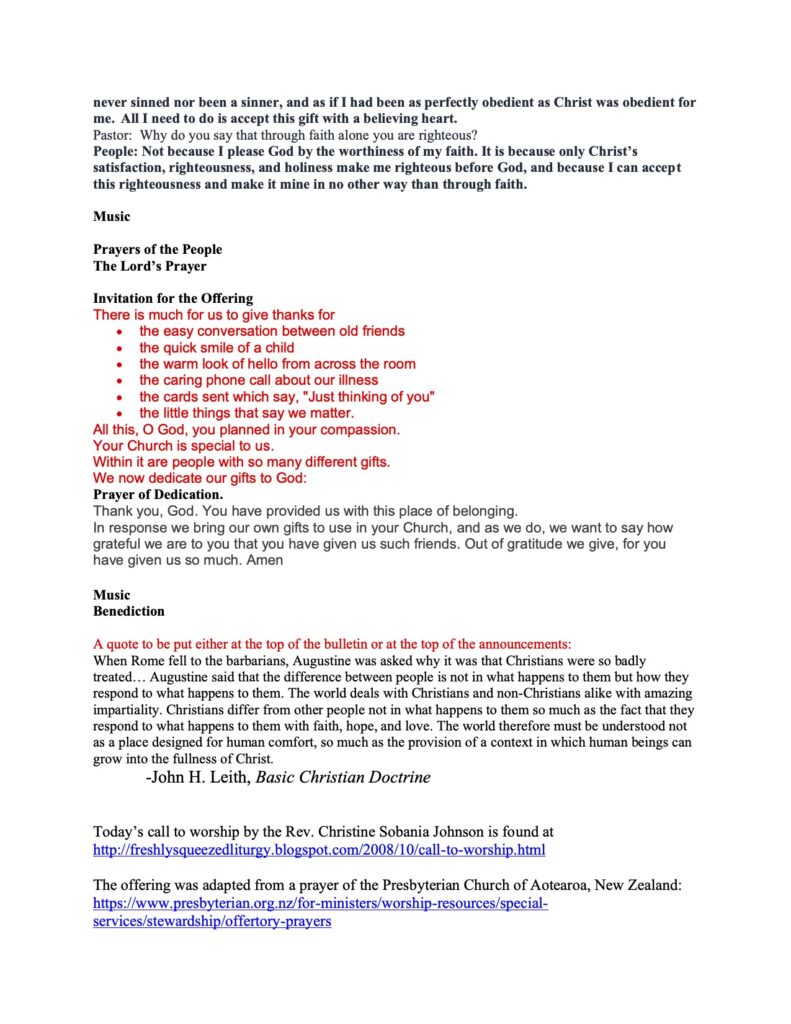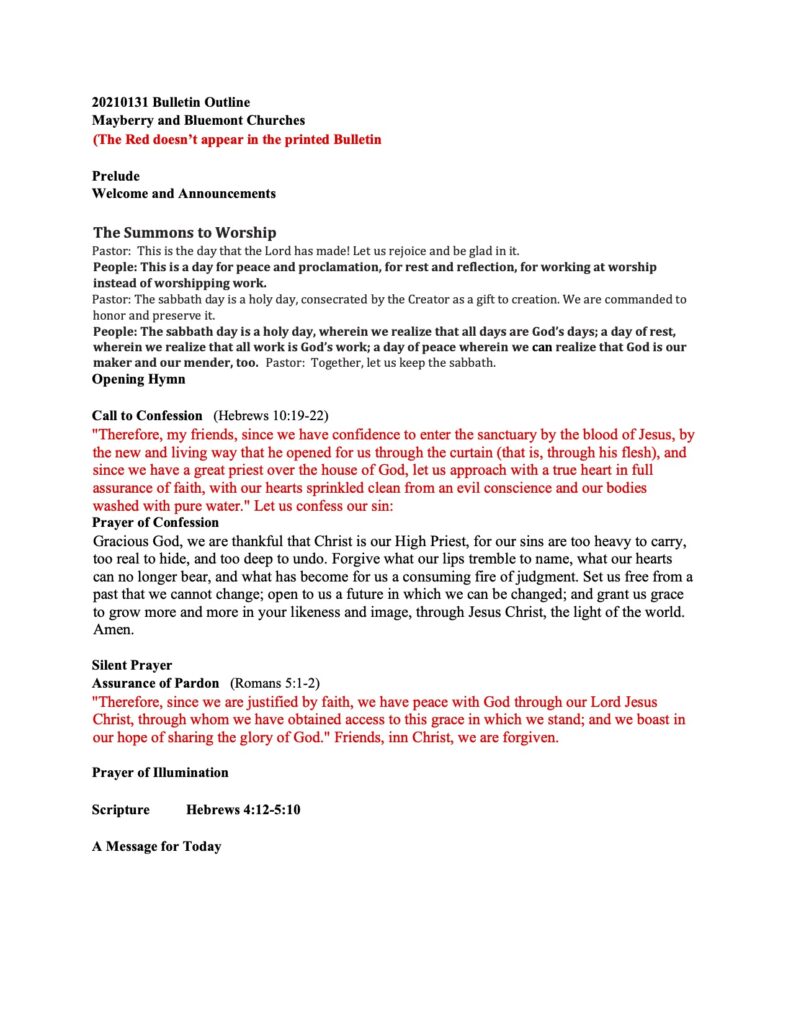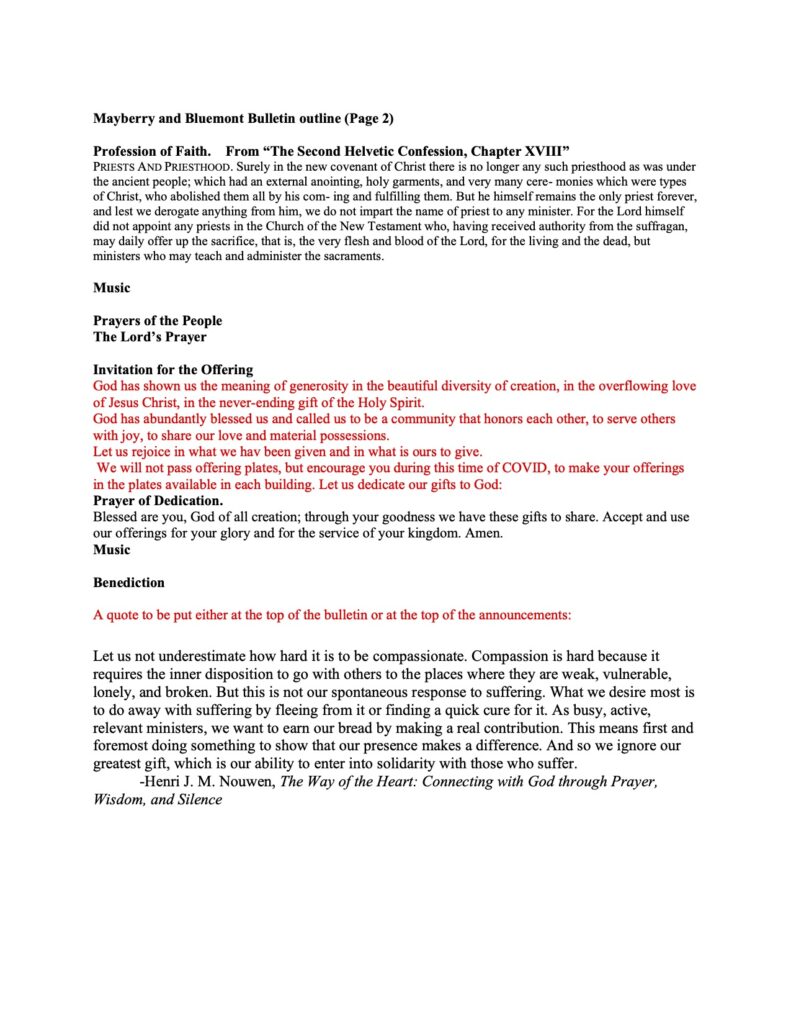Jeff Garrison
Mayberry and Bluemont Churches
March 14, 2021
Hebrews 10:1-18
c2021
The sermon was taped at Mayberry Church on Friday, March 12, 2021
At the beginning of worship
Over the past few weeks, as we’ve worked our way through the Book of Hebrews, we have been in an advanced Christological class. We’ve experienced Jesus as our High Priest. We have learned of Jesus establishing a new covenant. And we’ve explored the differences between earthly and heavenly sanctuaries.
Ideal verses the shadow
Much of this discussion in this part of Hebrews which we’re in, parallels a Platonic idea that compares the ideal with the shadow. We often mistake the shadow as reality.[1] In such, we see this sanctuary as a real place. But Hebrews makes the case the case that our earthly sanctuaries are only an imperfect representative of the heavenly reality. Through Jesus Christ, God casts off our sinfulness, which allows us to come into God’s presence. When our time here is over, to enter the real sanctuary.
Sacrifices in the First Century
The preacher of Hebrews has one last theological point to finish making before he moves into the section of this book dealing with ethical implications of what we believe about Jesus. He’s been talking about sacrifice all along. This would have been on the minds of many first century Jews. Even pagans sacrificed. This was seen as a reality in that era. But as we’ve already seen, the sacrifices witnessed at the temple were imperfect. They could not perfect those making the sacrifice. But Christ, who sacrificed himself, who paid the price of our sin once and for all, can perfect us.
Next week, we’ll hear the preacher’s call to persevere. Because of what Christ has done for us, we should stick with him. But before that, we’ll delve into the sacrifice Jesus made.
What does it mean to sacrifice?
So, let me ask you, what do we mean by sacrifice? Frederick Buechner describes sacrifice as “something that is made holy by giving it away for love.”[2] And that’s what Jesus does for us. He gives away his life out of love for the world. Such a definition should also help us understand our calling to sacrifice.
Read Hebrews 10:1-18
After the reading of Scripture
Warm Radiators
I was ordained in Ellicottville, New York. I spent three and a half years there, enjoying the life of a ski bum. While there, I lived in an old house, built in the late 1890s. My favorite thing about the house were the cast iron radiators. They were wonderful. Before Donna and I was married, it was just me and Happy, my cat. Happy loved those radiators, especially in the fall and spring. In the winter, because the weather was often very frigid, the radiators got too hot for her to sit on. But the rest of the year, they made a great perch for her to observe the neighborhood.
In the winter, while Happy stayed off the radiators, they were a perfect place to dry socks and gloves and to warm up a jacket or towel. I assure you, there is nothing like getting out of a shower and wrapping yourself in a towel that’s been warmed on a radiator. Likewise, there is nothing like heading out into the cold while wearing a prewarmed jacket or gloves. Such warmth just makes you feel good inside.
The warmth of God’s love
We should have similar warmth when we think about what God does for us. We’ve been created by God who loves us, who wants the best for us, and who adopts us as his own children. We’ve been redeemed by a God who doesn’t give up on us even when we think we’ve been just a big disappointment.
God’s love for us is so strong because he was willing to offer up his own life, in Jesus, to atone for our sin. We are cared by a God whose presence is with us always. Think of God’s love as that warmed towel or jacket, wrapping itself around us, warding off the cold.
Jesus is the reason we can be warmly drawn to God as opposed to hiding in fear. In him, we find forgiveness. We are cleansed. We are able stand boldly before God, not having to be shielded by a curtain like our Hebrew ancestors.
Jesus’ obedience to God meant he took up his cross. Jesus’ self-surrender to God was total. “Not my will but Thine,”[3]he prayed to his father. This prayer is “the climactic expression of a life of complete openness to God.”[4] As we learn in our text this morning, Jesus has made the ultimate sacrifice for us.
The meaning of “sacrifice”
Let’s think for a few minutes how we use the term “sacrifice.” It’s a noble term. In baseball, there’s the sacrifice fly. You hit a deep fly ball, which allows a runner on third base to make it home before the throw can reach the plate. While the batter doesn’t end up with a run on their record, he does the job necessary to help the team win.
Parents speak of their sacrifice for their kids. It may be so that they can have a better educator or a better experience with childhood. Depression era stories of parents who refused to eat until their children were fed touch our hearts.
We speak of sacrificing for our country. A soldier or sailor might be required to sacrifice their life. Think of the one who jumps on a live grenade in order to save his buddies. John F. Kennedy best described such sacrifice in his inaugural address, “Ask not what your country can do for you, ask what you can do for your country.”
In church, we often speak of sacrifice when we go beyond in giving. Maybe it’s to build a new community center or to give up one’s life of comfort and become a missionary.
The one thread that holds all these types of sacrifices together is that they are done for someone else. It’s not a sacrifice if you’re doing it for yourself.
The Buechner definition I used earlier rings true here. “A sacrifice is something made holy by giving it away for love.”
Jesus’ sacrifice
Jesus speaks of his sacrifice in this way: “Greater love has no man than this, that a man lay down his life for his friends.”[5] And Jesus shows us what sacrifice really looks like. The cross is the ultimate symbol of sacrifice.
Martin Luther King realized the deep meaning of the cross when he said: “[W]hen I took up the cross, I recognized its meaning… It is not something that you wear. The cross is something that you bear and ultimately that you die on.”[6]
While that is true, and our faith demands our lives, the good news is that we don’t have to die for our sin. Jesus did that. But a sacrifice means we do something for the well-being of another.
Today’s text
In our morning reading, we hear two extensive quotes from the Old Testament. The first, from the Psalms, reminds us that God doesn’t need our sacrifices.[7] Why did God need those animals that were sacrificed? After all, they belonged to God to start with. In a way, everything we have belongs to God and God can claim it at any time. Not in need of sacrifices as such, God is pleased to sacrifice for us. This sacrifice, through Jesus, is eternal. It does not need to be made day in and day out, like the old sacrifices.
The second quote, which we’ve already heard in Hebrews,[8] comes from Jeremiah. We are reminded that in the new covenant, God writes his law in our hearts and minds.[9] Having been freed from sin, we are open to hear God’s word and to live in a new way.
The importance of sacrifice
In many ways, we don’t like talking about sacrifices these days. We’re conditioned to want what we think is best for us. I remember how, after 911, instead of us as a nation being called to sacrifice to win the war against terror, we were encouraged to go out and continue spending to keep the economy going.
But sacrifices are important. By sacrificing, we demonstrate the love Jesus calls us to have for others. Likewise, by Jesus’ sacrifice, we experience the incredible love that God has for us.[10] Furthermore, our sacrifices commit us to the faith we proclaim.
We are so blessed that we should feel God’s love wrapping us up in warmth. And because we’re blessed, because Jesus sacrificed for us, we’re to be a blessing to others. Amen.
[1] While I point this out, we must understand that Christianity isn’t a Platonic faith and there are teachings within Plato that are contrary to Christian theology and more akin to the Gnostic heresy. The classic teaching of Plato on the differences between the ideal and the shadow are found in Book Seven of The Republic, with the analogy of the cave.
[2] Frederick Buechner, Wishful Thinking: A Theological ABC (New York: Harper and Row, 1973), 83
[3] Luke 22:42.
[4] Geoffrey Wainwright, Doxology: The Praise of God in Worship, Doctrine, and Life (New York: Oxford University Press, 1980), 22
[5] John 15:13.
[6] Quote from James H. Cone, The Cross and the Lynching Tree (Maryknoll, NY: Orbis Books, 2011), 84.
[7] Hebrews 10:5-7; Psalm 40:6-8.
[8] See Hebrews 8:8-12.
[9] Hebrews 10:16 & 17; Jeremiah 31:33-34.
[10] Romans 5:8.






